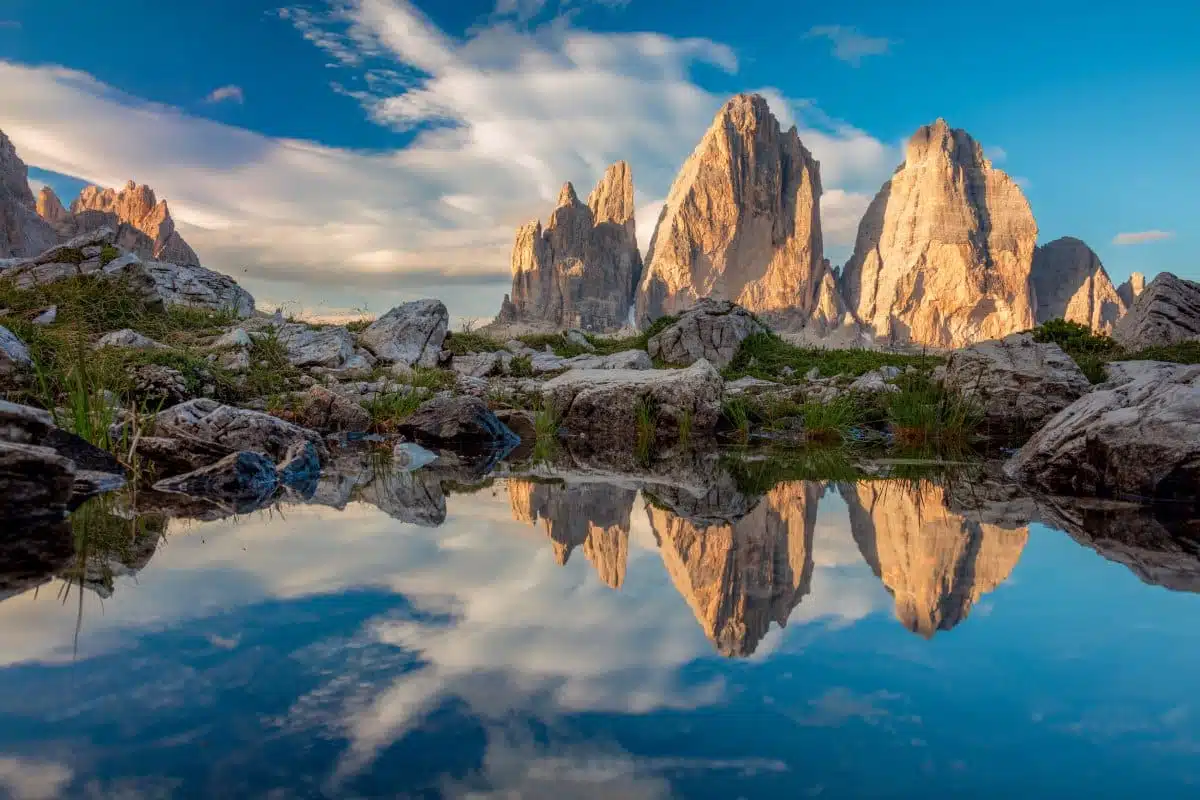The Italian Dolomites, a UNESCO World Heritage site, is the awe-inspiring beauty of nature. This mountain range in northeastern Italy is renowned for its stunning peaks, deep valleys, and picturesque landscapes that change with the seasons. From thrilling outdoor activities to tranquil retreats amidst nature, the Dolomites offer diverse experiences. This guide explores the region, providing a comprehensive overview of twelve must-visit destinations and activities, each with unique insights and tips to enhance your journey.
1. Tre Cime di Lavaredo
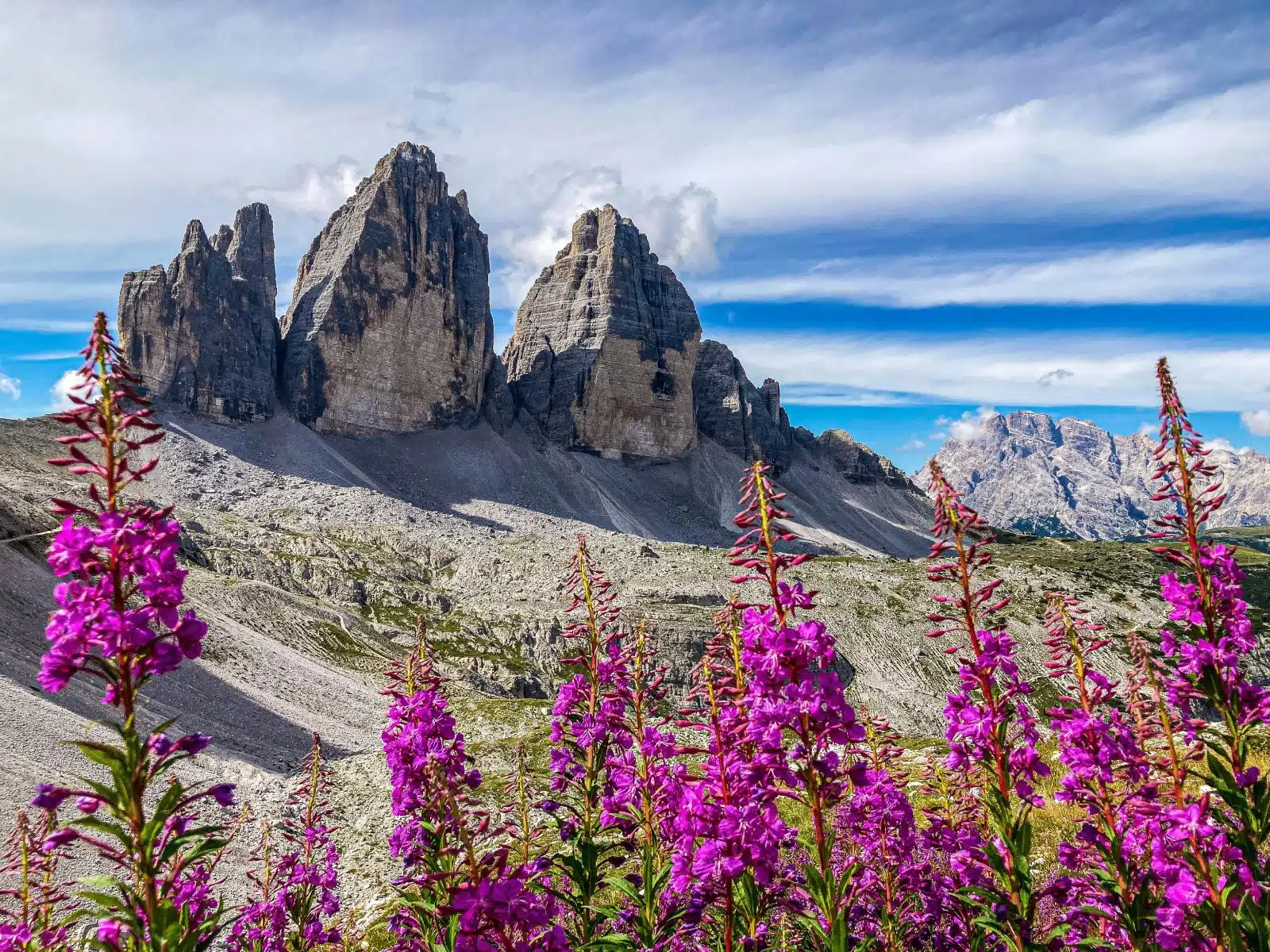
Image Credit: Pexels / Elia Pinzin
Tre Cime di Lavaredo, the three iconic battlement-like peaks, are synonymous with the Dolomites. The surrounding area offers some of the most accessible yet profoundly stunning hiking trails, providing panoramic views of the jagged mountain landscape. The circuit around the peaks is a moderate hike, allowing even those with limited mountaineering experience to immerse themselves in the heart of the Dolomites. Along the way, historical sites from World War I, including tunnels and fortifications, tell the story of the region’s past.
Insider’s Tip: For a unique experience, embark on the hike during the early morning hours. The sunrise illuminating the peaks offers an unforgettable spectacle, and the trails are less crowded.
2. Val Gardena
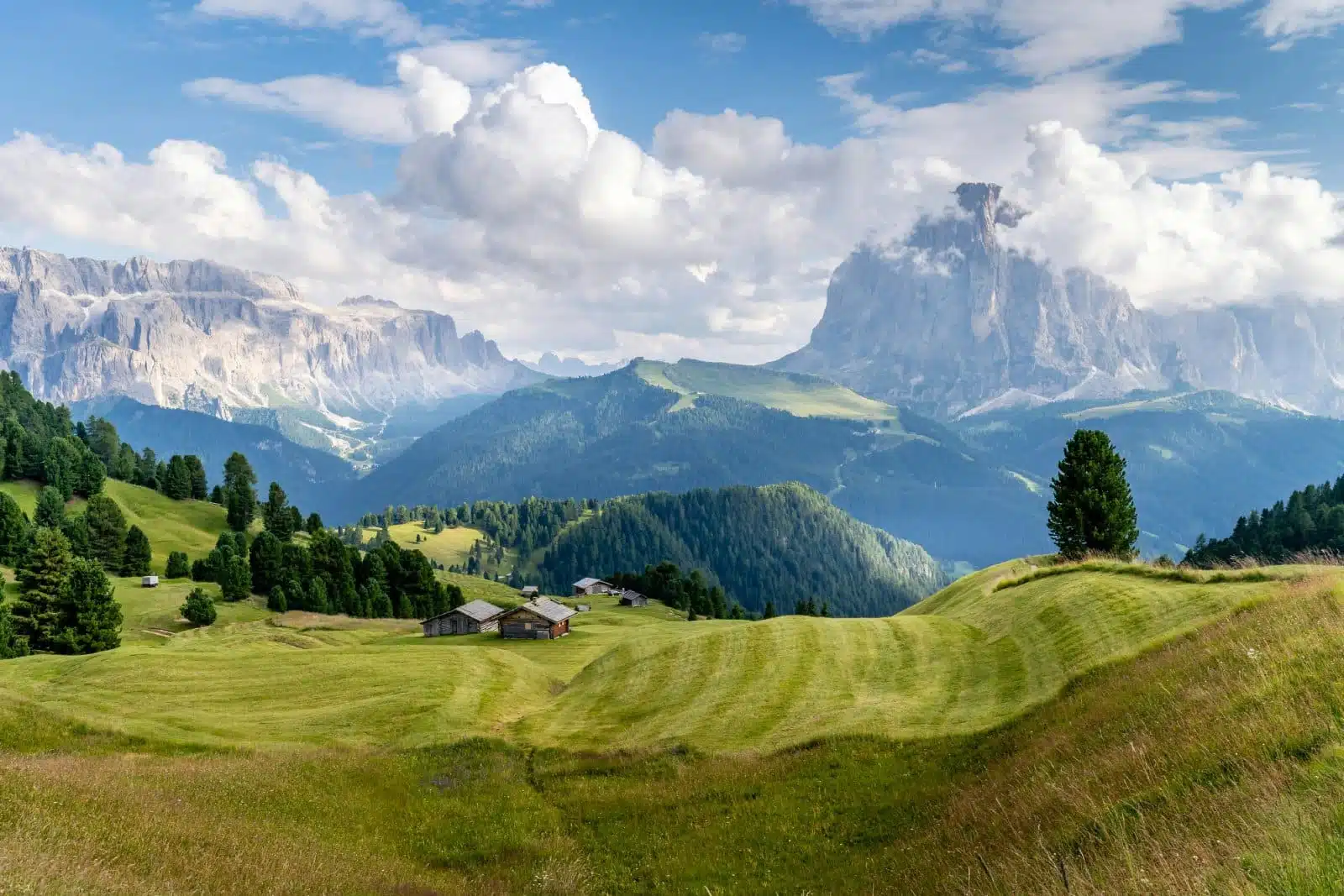
Image Credit: Pexels / Chavdar Lungov
Val Gardena is a valley in the Dolomites known for its rich Ladin culture, wood carving tradition, and as a world-class skiing destination. The valley, with its three picturesque towns of Ortisei, Santa Cristina, and Selva, serves as a gateway to the expansive Dolomiti Superski area and the Sella Ronda ski circuit. In summer, Val Gardena transforms into a hiker’s paradise, with trails leading through lush meadows and dense forests, beneath towering rock faces.
Insider’s Tip: Visit during the off-season months, like late spring or early autumn, to enjoy the beauty of Val Gardena without the crowds. This period also offers the chance to witness the valley’s vibrant cultural festivals.
3. Lake Braies
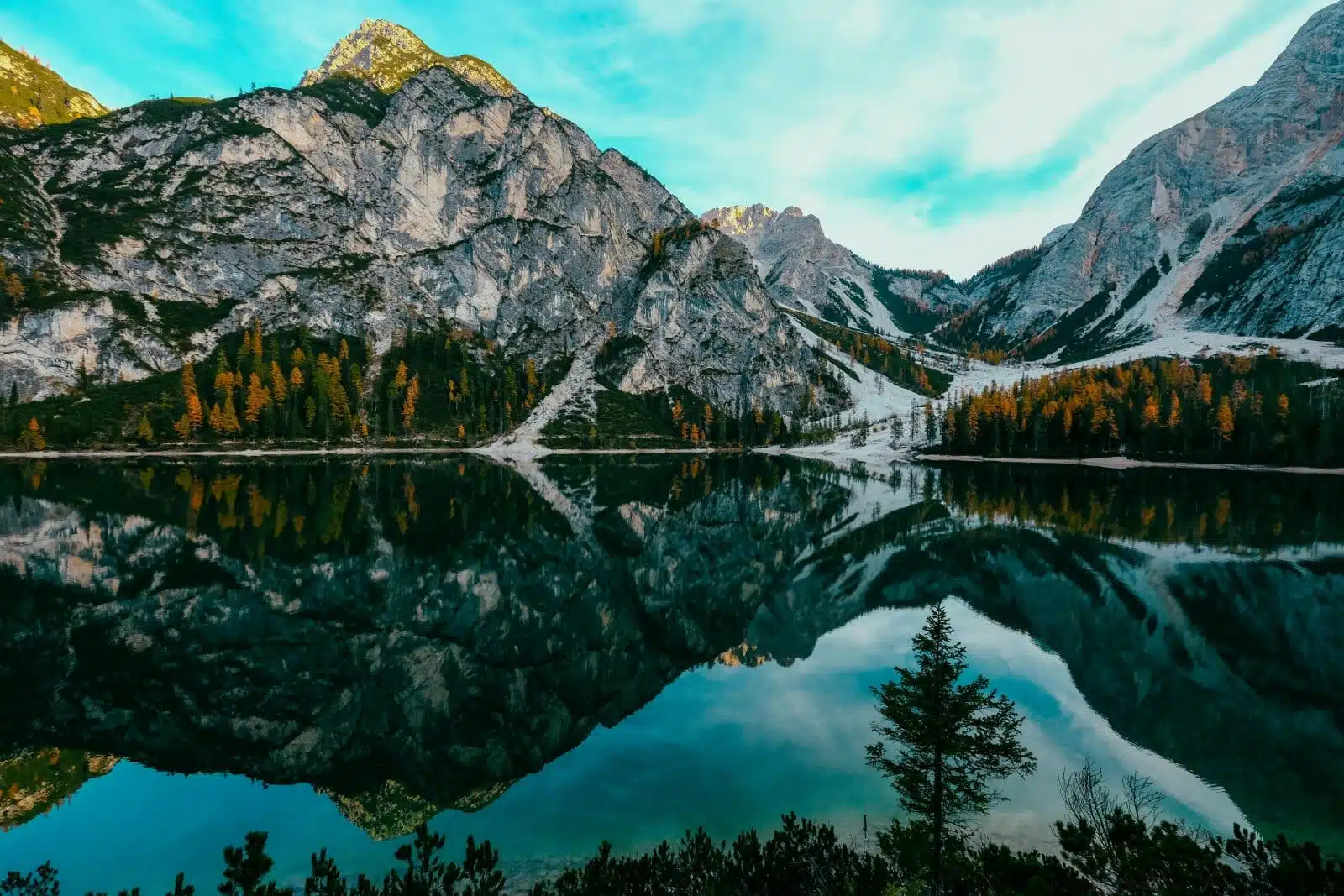
Image Credit: Pexels / Francesco Ungaro
Lake Braies, known as Pragser Wildsee in German, is a pristine alpine lake nestled in a valley surrounded by forested mountains. Its emerald waters reflect the towering peaks, making it one of the most photographed spots in the Dolomites. Visitors can enjoy a leisurely walk around the lake or rent a traditional wooden boat to paddle the tranquil waters. The lake is also a starting point for several hiking trails, including paths leading to the Fanes-Sennes-Braies National Park.
Insider’s Tip: Arrive early in the morning to experience the lake’s serene beauty in solitude and capture the perfect reflection of the mountains in the undisturbed water.
4. Alta Badia
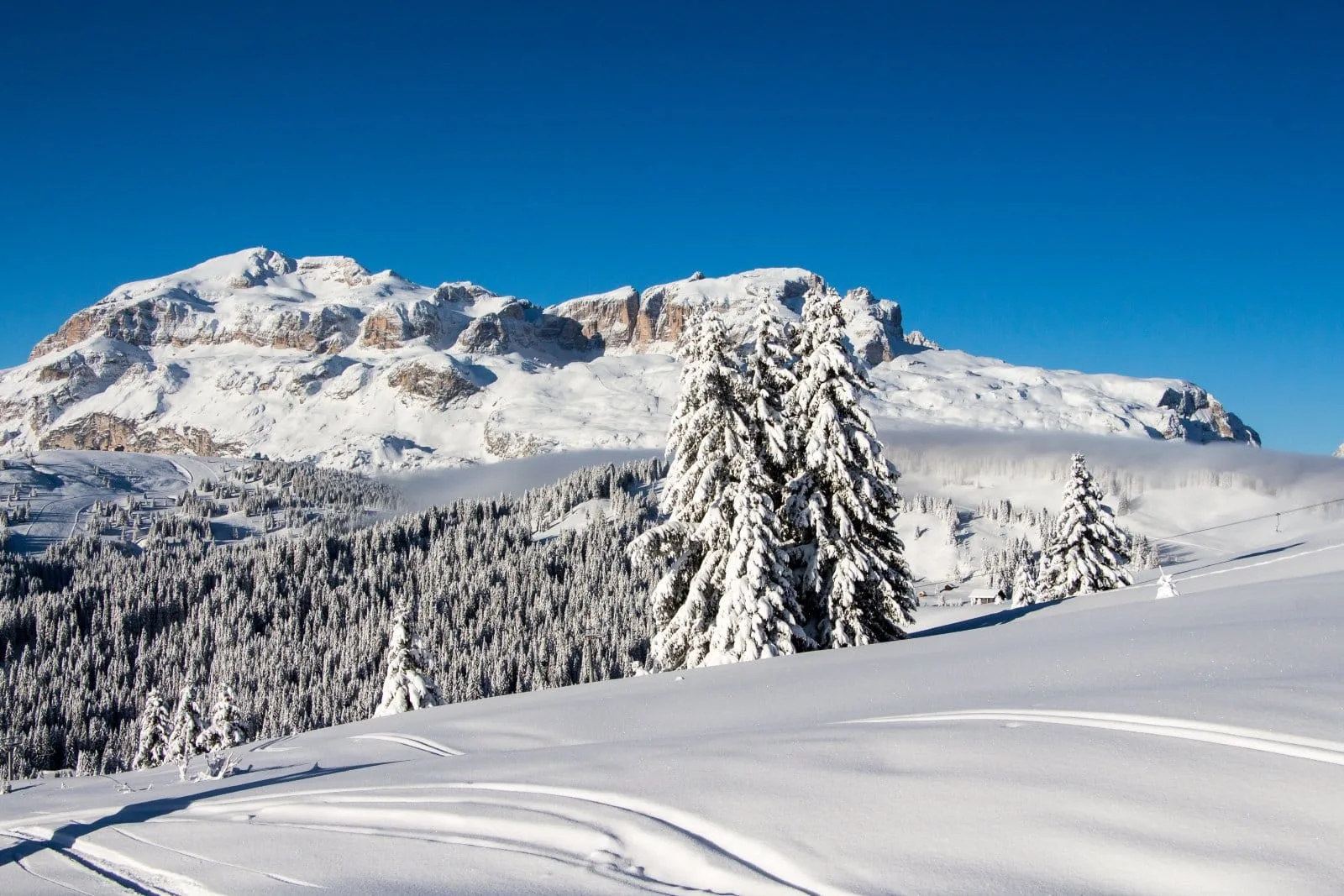
Image Credit: Shutterstock / Tampa
Alta Badia, a valley in the heart of the Dolomites, is renowned for its excellent skiing facilities, stunning natural beauty, and culinary excellence. The area is a blend of Italian and Ladin cultures, offering visitors a unique cultural experience. Alta Badia’s slopes are part of the Dolomiti Superski area, making it a paradise for winter sports enthusiasts. In summer, it transforms into a haven for hikers and cyclists, with numerous trails and routes crisscrossing the scenic landscape.
Insider’s Tip: Dine at one of Alta Badia’s mountain refuges or “rifugios” to experience traditional Ladin cuisine with a modern twist and breathtaking mountain views.
5. The Sella Ronda
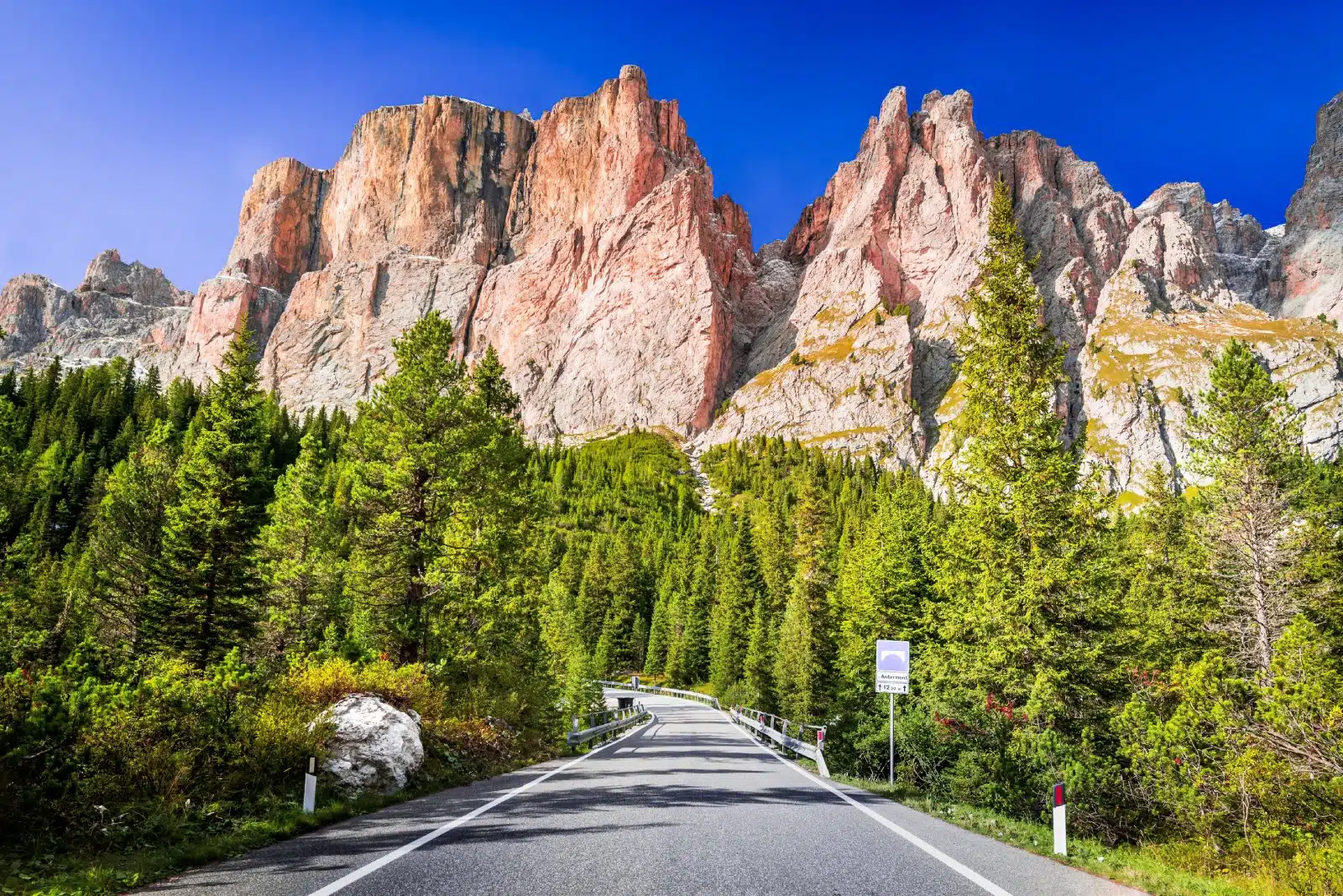
Image Credit: Shutterstock / ecstk22
The Sella Ronda, a circular ski route around the massif of the Sella group, is one of the most spectacular skiing experiences in the world. It connects four Ladin valleys – Val Gardena, Alta Badia, Val di Fassa, and Arabba – and can be completed in one day. The route offers diverse scenery and ski runs, suitable for intermediate skiers. In summer, the Sella Ronda becomes a challenging route for cyclists and a scenic drive for motorists.
Insider’s Tip: Start your journey early and in a clockwise direction to ensure you complete the circuit before the lifts close, allowing for leisurely stops to enjoy the views and cuisine.
6. Cortina d’Ampezzo
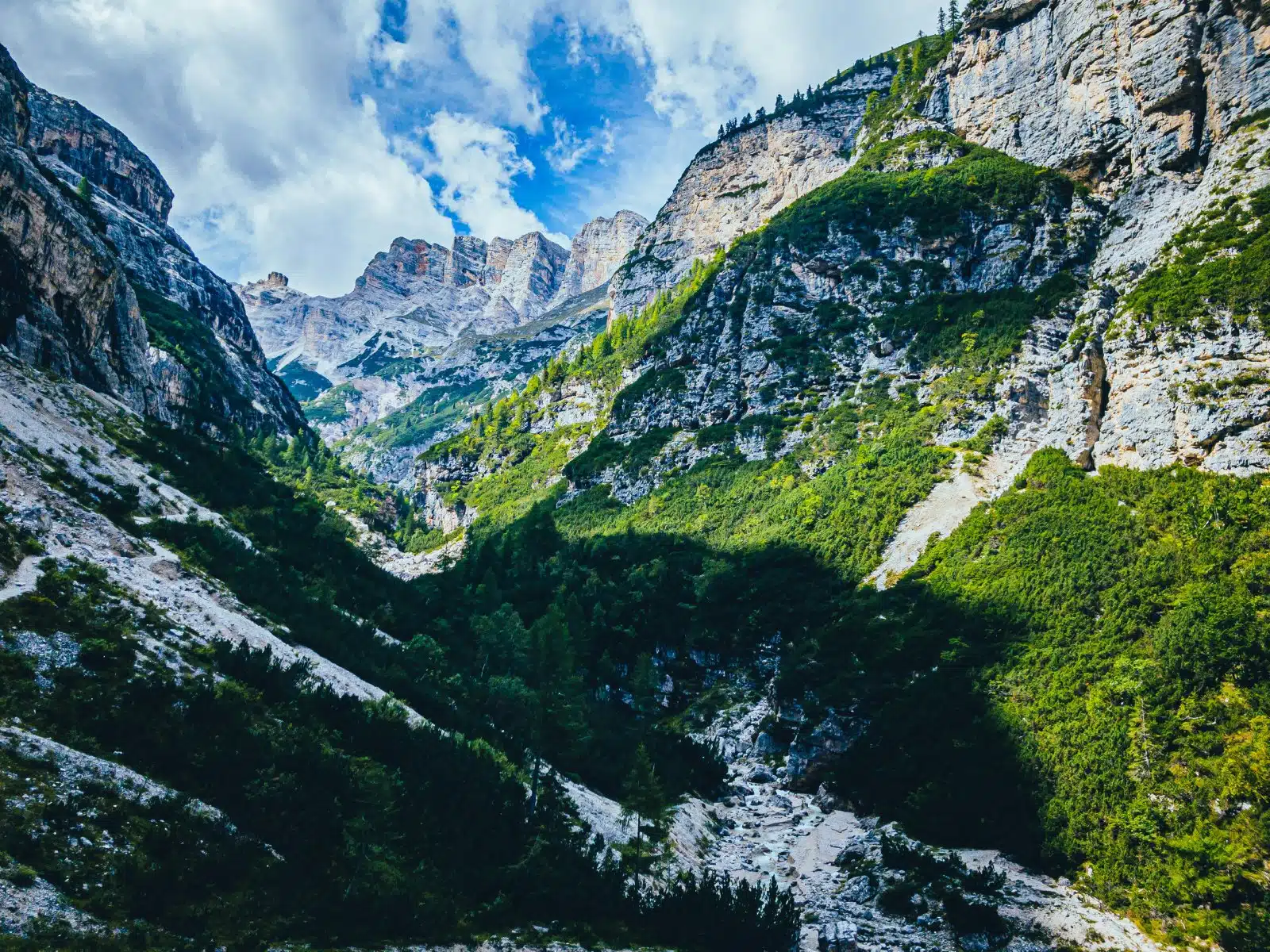
Image Credit: Pexels / Jędrzej Koralewski
Cortina d’Ampezzo, often referred to as the “Queen of the Dolomites,” is a stylish resort town known for its stunning landscapes, world-class skiing, and upscale shopping. The town has hosted numerous international sporting events, including the Winter Olympics, and is part of the Dolomiti Superski area. Beyond skiing, Cortina offers a wealth of activities, from hiking and climbing in the summer to cultural experiences and gourmet dining year-round.
Insider’s Tip: Explore the Great War Ski Tour to experience a unique combination of skiing and history, visiting sites significant to World War I in the surrounding mountains.
7. Seceda
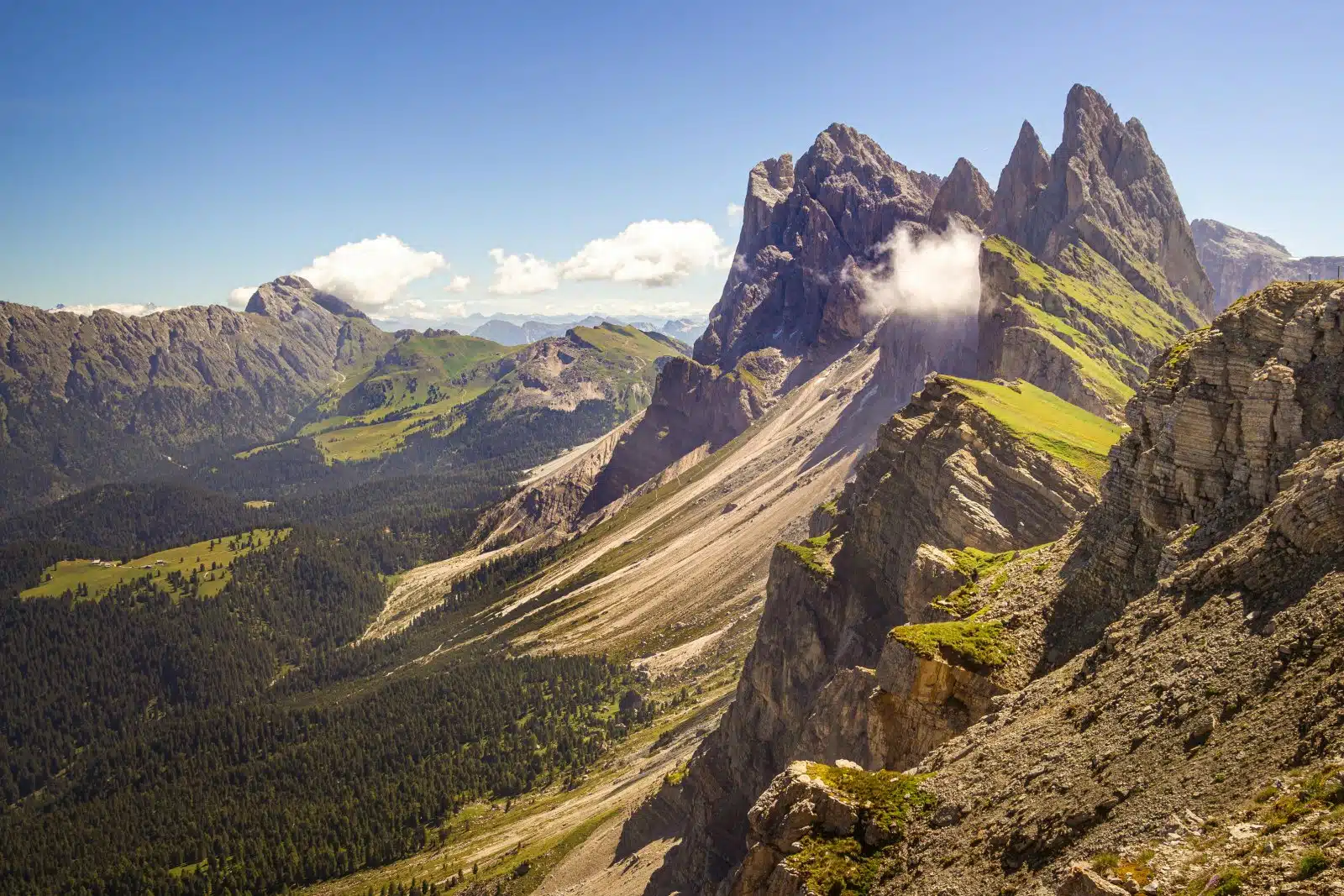
Image Credit: Pexels / TheWonderOfLife
The Seceda mountain ridge offers some of the most dramatic views in the Dolomites, with its steep, grassy slopes dropping sharply to Val Gardena below. Accessible via cable car from Ortisei, the summit provides a starting point for numerous hiking trails, including the famous Odle peaks. The area is particularly stunning in the early summer when the meadows are in full bloom, and in autumn, when the larch trees turn a golden yellow.
Insider’s Tip: For photographers, the best light occurs during the golden hour, just after sunrise or before sunset, when the peaks of the Odle group glow with a warm light.
8. Rosengarten Group
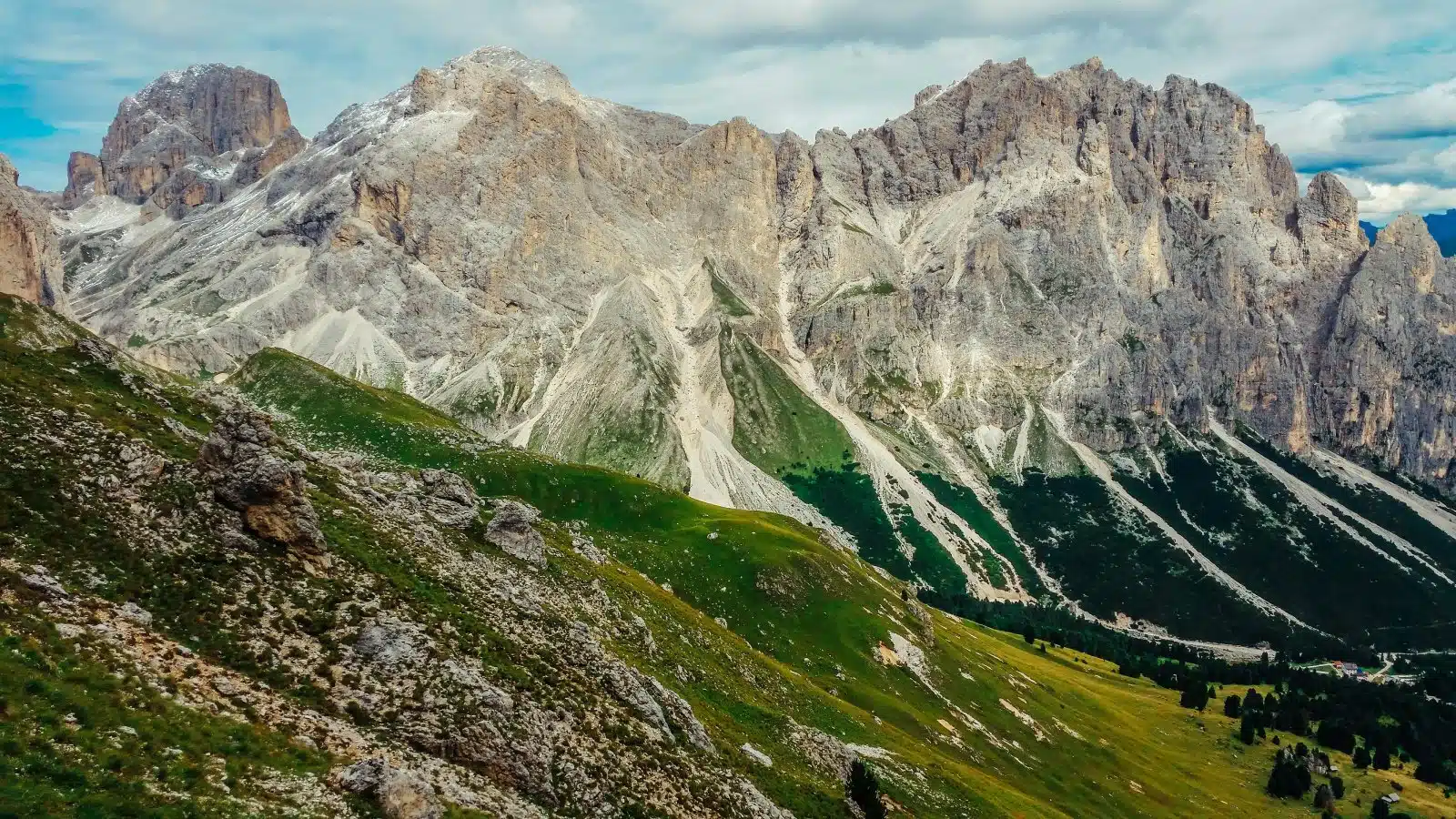
Image Credit: Pexels / Jędrzej Koralewski
The Rosengarten Group, also known as Catinaccio, is a massif in the Dolomites known for its pink-hued limestone cliffs that glow at sunset. The area is steeped in legend and offers a range of hiking and climbing routes, from leisurely walks to challenging via ferratas. The Vajolet Towers, six striking peaks within the Rosengarten Group, are a particular highlight for climbers.
Insider’s Tip: Experience the Enrosadira, the alpenglow phenomenon that turns the mountains a fiery red at sunset, from a vantage point in the Vajolet Valley for an unforgettable sight.
9. Marmolada
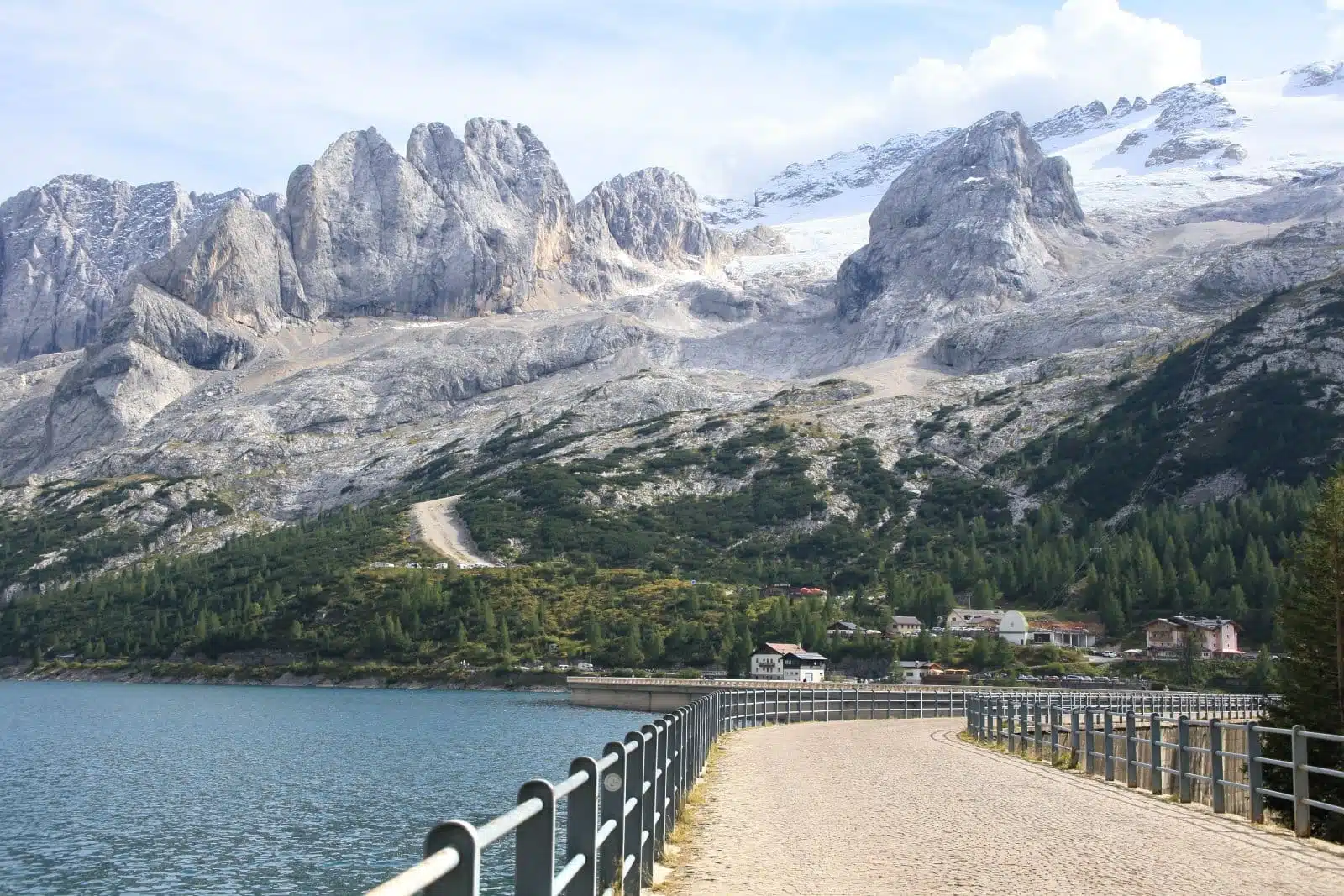
Image Credit: Shutterstock / mary416
Marmolada, the highest peak in the Dolomites, is often referred to as the “Queen of the Dolomites.” It boasts the region’s largest glacier, offering skiing even in summer. The peak is accessible via cable car, which takes visitors to breathtaking viewpoints and the starting point for several hikes. The Marmolada War Museum, located in a cave within the mountain, offers insights into the mountain’s role during World War I.
Insider’s Tip: For mountaineers, the Via Ferrata delle Trincee offers a challenging but rewarding route, combining historical interest with spectacular alpine scenery.
10. Lago di Sorapiss
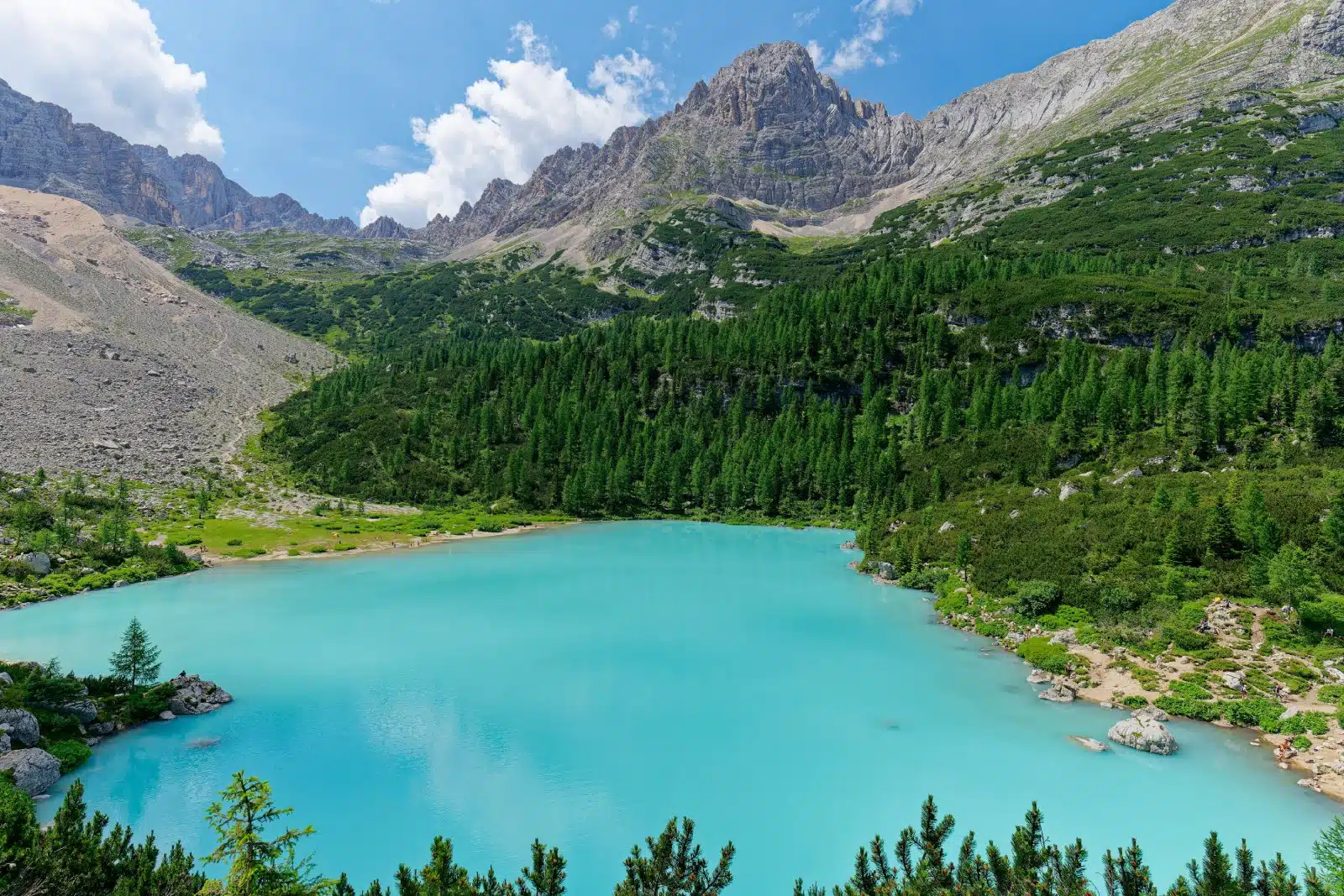
Image Credit: Shutterstock / stu.dio
Lago di Sorapiss, with its distinctive turquoise waters, is a hidden gem in the Dolomites. The lake is reached via a moderately challenging hike through the Sorapiss mountain range, offering stunning views and a tranquil setting. The journey to the lake is an adventure in itself, featuring narrow paths, wooden bridges, and dramatic cliffside views.
Insider’s Tip: The trail to Lago di Sorapiss can become crowded during peak times. Start your hike early to enjoy the peace and beauty of the lake and its surroundings in solitude.
11. Via Ferrata
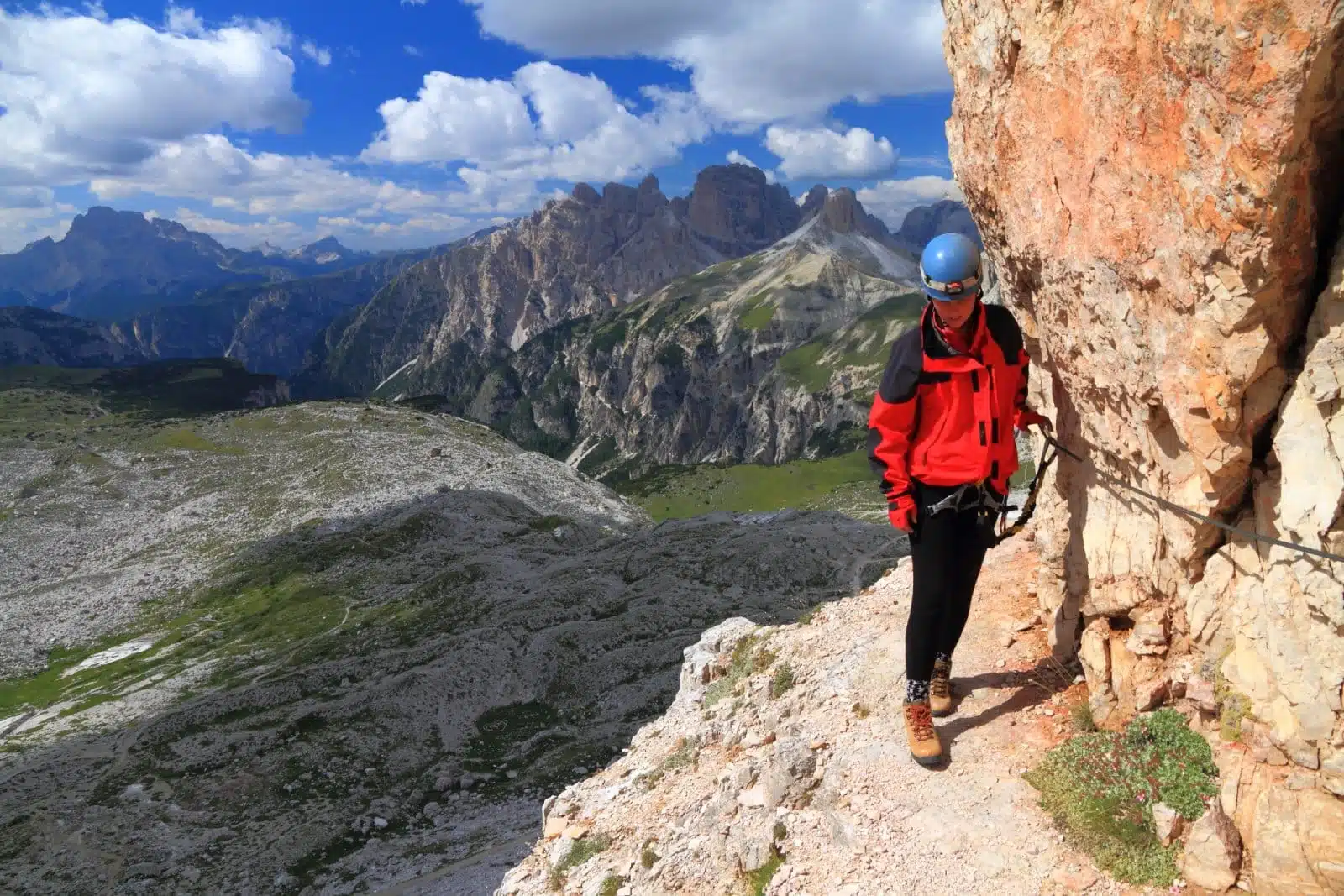
Image Credit: Shutterstock / Inu
The Dolomites are the birthplace of the via ferrata, protected climbing routes that offer a unique way to experience the mountains. These routes, equipped with steel cables, ladders, and bridges, allow adventurers to tackle dramatic cliffs and peaks without the need for technical climbing skills. The Dolomites boast some of the most scenic and historically significant via ferratas, offering breathtaking views and a thrilling experience.
Insider’s Tip: Beginners should consider hiring a guide to ensure safety and gain confidence via ferrata. The Via Ferrata Ivano Dibona, known for its spectacular views and historical significance, is a great starting point.
12. Fanes-Sennes-Braies Natural Park
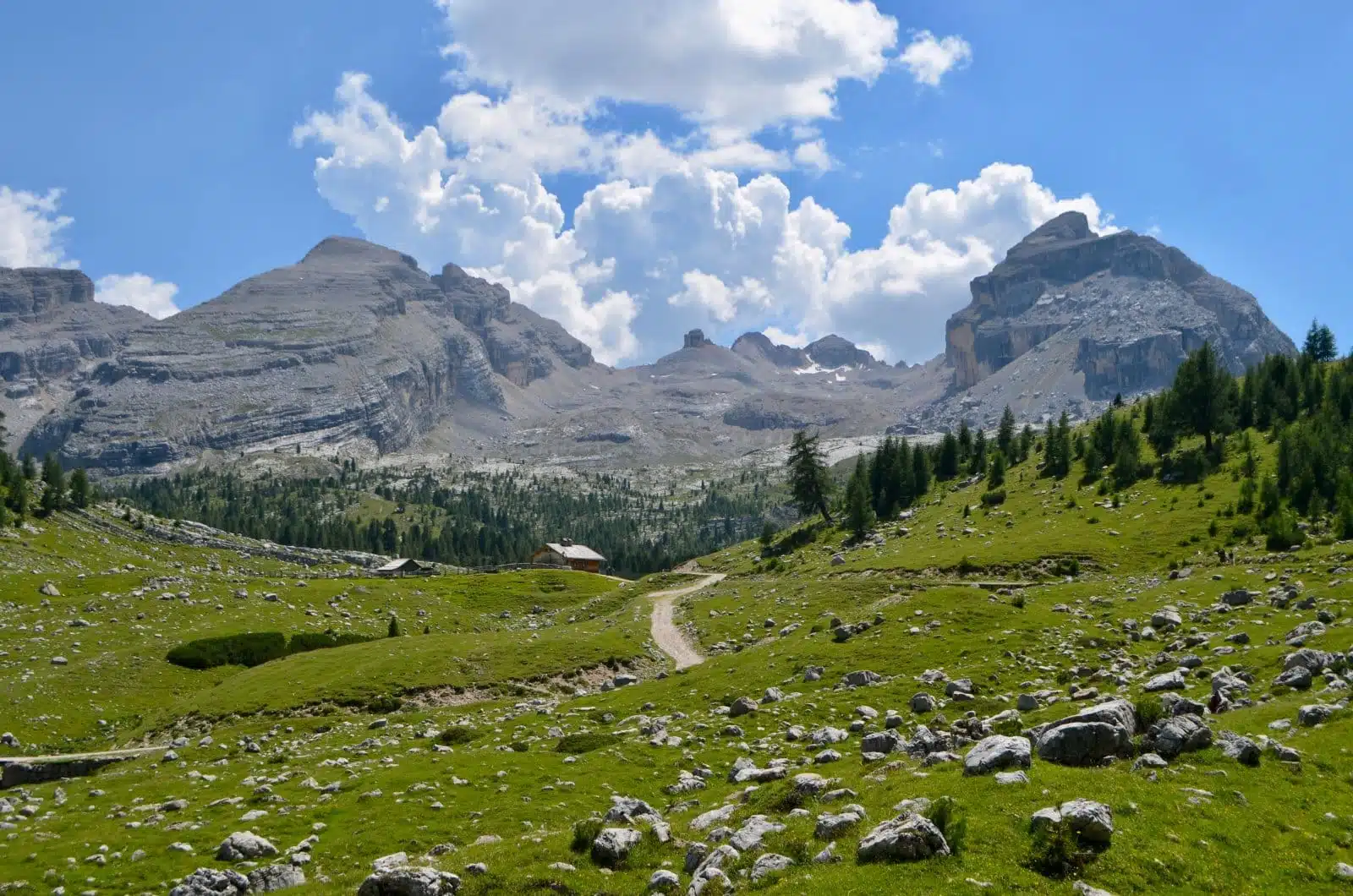
Image Credit: Shutterstock / Fraank
This natural park encompasses a vast area of the Dolomites, featuring a diverse landscape of high-altitude plateaus, serene alpine lakes, and dense forests. It’s a haven for hikers, with trails leading to remote mountain huts, dramatic viewpoints, and tranquil lakes. The park is also rich in wildlife and flora, offering chances to spot marmots, eagles, and a variety of alpine plants.
Insider’s Tip: Explore the park on a multi-day hike, staying in mountain huts along the way to fully immerse yourself in the natural beauty and tranquility of the Dolomites.
When to Travel

Image Credit: Pexels / Jess Bailey Designs
The ideal time to visit the Italian Dolomites largely depends on the activities you wish to pursue. For winter sports enthusiasts, including skiing and snowboarding, the best months are from December to March, when the region is blanketed in snow, and the ski resorts are in full operation. This period offers a magical winter landscape and a vibrant après-ski culture.
If you’re interested in hiking, climbing, or simply enjoying the natural beauty and diverse flora of the Dolomites, the summer months from June to September are most suitable. During this time, the weather is generally warm and sunny, providing excellent outdoor activities and exploration conditions. Additionally, the summer months host various cultural and music festivals.
For those seeking solitude and the chance to witness the dramatic change of seasons, the shoulder months of May and October can be particularly rewarding. During these times, the crowds are fewer, and the natural scenery undergoes a stunning transformation, with wildflowers blooming in spring and the larch trees turning a golden hue in autumn.
How to Get There

Image Credit: Shutterstock / Olena Yakobchuk
The Dolomites are accessible by a combination of international flights, trains, and car travel. The most common entry points for international travelers are the airports in Venice (Marco Polo Airport) and Milan (Malpensa Airport) in Italy, and Innsbruck Airport in Austria. Each of these airports offers car rental services and access to regional train and bus networks, making it possible to reach the Dolomites with relative ease.
From Venice: The drive from Venice to the heart of the Dolomites, such as Cortina d’Ampezzo, takes approximately 2 to 2.5 hours. Regular bus services also connect Venice with the Dolomites, offering a convenient alternative to driving.
From Milan: Traveling from Milan requires a longer drive of about 4 to 5 hours to reach the Dolomites. Alternatively, you can take a train from Milan to one of the closer cities like Bolzano or Trento and then continue by bus or rent a car.
From Innsbruck: Innsbruck, Austria, is another gateway to the Dolomites, especially for visitors coming from northern Europe. The drive from Innsbruck to the Italian border and into the Dolomites takes about 2 hours. Train services are also available from Innsbruck to South Tyrol, with bus connections to various destinations in the Dolomites.
Regardless of the mode of transportation chosen, traveling to the Dolomites offers the opportunity to witness the stunning landscapes of Northern Italy and the Alps. It’s advisable to plan your journey in advance, especially during peak seasons, to ensure availability of transportation and accommodation.
The Bottom Line

Image Credit: Pexels / Pixabay
The Italian Dolomites offer an unparalleled blend of natural beauty, outdoor adventure, and cultural richness. Whether you’re scaling via ferrata, skiing the vast slopes, or simply enjoying the serene beauty of a mountain lake, the Dolomites promise an unforgettable experience. Remember, the best times to visit are summer for hiking and winter for skiing, but the shoulder seasons offer their own charm with fewer crowds. Access to the Dolomites typically takes place through major cities such as Venice or Innsbruck, with local transport options available to reach the heart of the mountains. Embrace the adventure, respect the natural environment, and discover the myriad wonders of the Dolomites.
More From The Green Voyage
12 Best Practices for Sustainable Travel in 2024 – How to Travel With Minimal Environmental Impact
Unlocking Hotel Perks – A Traveler’s Guide to Maximizing Hotel Reward Programs for Optimal Benefits
Travel Hacks for Frequent Flyers – 6 Tips and Tricks to Make the Best of Air Travel
The post A Guide to the Italian Dolomites 2024 first appeared on The Green Voyage.
Featured Image Credit: Shutterstock / Taiga.
For transparency, this content was partly developed with AI assistance and carefully curated by an experienced editor to be informative and ensure accuracy.
Tips for Trip Success
Book Your Flight
Find an inexpensive flight by using Kayak, a favorite of ours because it regularly returns less expensive flight options from a variety of airlines.
Book Your Hotel or Special Accommodation
We are big fans of Booking.com. We like their review system and photos. If we want to see more reviews and additional booking options, we go to Expedia.
You Need Travel Insurance!
Good travel insurance means having total peace of mind. Travel insurance protects you when your medical insurance often will not and better than what you get from your credit card. It will provide comprehensive coverage should you need medical treatment or return to the United States, compensation for trip interruption, baggage loss, and other situations.Find the Perfect Insurance Plan for Your Trip
